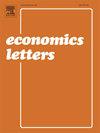外资银行进入对新兴经济体银行流入的影响
IF 2.1
4区 经济学
Q2 ECONOMICS
引用次数: 0
摘要
本研究考察了1995年至2013年间外资银行进入对33个新兴经济体跨境银行流入的影响。利用双边国家级数据集,该分析揭示了三个关键发现。首先,虽然外资银行的首次进入并未显著影响外资银行母国的银行流入量,但随后的外资银行进入导致东道国跨境银行流入量大幅增加。其次,后进银行利用现有外资银行的存在,更有效地吸引银行资金。第三,我们的研究结果强调了地理邻近性、共同的制度框架以及母国和东道国有利的经济条件是这些资金流入的关键驱动因素。这些发现强调了促进对外资银行持续开放、同时有效降低潜在风险的政策的重要性。本文章由计算机程序翻译,如有差异,请以英文原文为准。
The effects of foreign bank entry on bank inflows in emerging economies
This study examines the impact of foreign bank entry on cross-border bank inflows into 33 emerging economies from 1995 to 2013. Using a bilateral country-level dataset, the analysis reveals three key findings. First, while the first entry of foreign banks does not significantly affect bank inflows from the home country of the foreign bank, the subsequent entries of foreign banks lead to a substantial increase in cross-border bank inflows to the host country. Second, subsequent-entry banks leverage the presence of incumbent foreign banks to attract bank flows more effectively. Third, our results stress the role of geographical proximity, shared institutional frameworks, and favorable economic conditions in both home and host countries as critical drivers of these inflows. These findings underscore the importance of policies that promote persistent openness to foreign banks while effectively mitigating potential risks.
求助全文
通过发布文献求助,成功后即可免费获取论文全文。
去求助
来源期刊

Economics Letters
ECONOMICS-
CiteScore
3.20
自引率
5.00%
发文量
348
审稿时长
30 days
期刊介绍:
Many economists today are concerned by the proliferation of journals and the concomitant labyrinth of research to be conquered in order to reach the specific information they require. To combat this tendency, Economics Letters has been conceived and designed outside the realm of the traditional economics journal. As a Letters Journal, it consists of concise communications (letters) that provide a means of rapid and efficient dissemination of new results, models and methods in all fields of economic research.
 求助内容:
求助内容: 应助结果提醒方式:
应助结果提醒方式:


